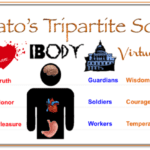Aristotle’s Nicomachean Ethics Book X
So far in the book, Aristotle has established that there is one end that we all share and are directed towards by our very being: happiness. Happiness is that for the sake of which all else is done: it is perfect and self sufficient. To determine what that is, much of his argumentation rested on The Physics – he presumes his students already understand why all individuals of the same class have the same functional act. That is to say, though they don’t do the same particular actions, they ultimately seek the same end.((Someone might say this is circular: “one end” explains why we act, and why we act shows that there is one end. But remember how we got here. Every other being in the universe acts for a certain end stateAll things behave in consistent ways, and if))
Chapter 1 – Why study pleasure?
Some thought it was good. Others thought it was bad because they were deceived or because it is easier.
Its proper to animal life (e.g. educating children with punishment/reward), its important for a happy life, and there is much disagreement about it.
Chapter 2 – What were the opinions?
Eudoxus thought pleasure was good because
- rational and nonrational animals seek it,
- and pain is to be avoided –
It is even the greatest good because:
- we choose it for its own sake
- it is not added to any good (problem here is that it shows that pleasure is just one good among others)
Aristotle responds to the last point by stating that pleasure is the good, then nothing else would be good or choiceworthy. The life of pleasure is more desireable in combination with intelligence, but its more desirable than a life of pleasure alone. So it can’t itself be the good.
In response to the first argument, he says that there would be no good at all, since even the judgment of animals would be based on a lie.
In response to the second, pain is opposed to the good and opposed to evil. When it is not good to hit head against wall, pain prevents us from doing that, therefore pain opposes evil.
In sum, pleasure and pain would necessarily always need to be pursued and avoided. This makes no sense. I brush my teeth because its good for me (and pleasurable in the long run) even though its painful or neutral now.
Chapter 3 – Why is pleasure not a good?
Just because pleasure is not a quality, does not mean it is not a good.
- Response: Happiness and virtuous activities (operations) are good and yet they are not qualities
Opposed: Second, the good is definite, but pleasure is indefinite admitting of intensity.
- Response: But there is not more or less virtue and yet virtue is good. (When they think of pleasures being indefinite, they are thinking of mixed pleasures, not pure ones)
Opposed: Third, pleasure is a process and becoming and therefore incomplete, but what is good is complete.
- Response: Pleasure is not a process because processes have quickness and slowness. It is possible to pass into a pleasured state quickly, but not, once in that state, to feel it quickly.
Opposed: Fourth, many pleasures are disgraceful and not good.
- Response: These pleasures are not pleasant simpliciter, but secundum quid, because they have been habituated badly and lack internal unity. Pleasures are choiceworthy only when they come from good sources and they differ in species.
Pleasure is not universally good because 1) there is a difference between a friend a flatterer whether we know him to be so or not, 2) no would would choose to live their life as a child or pig even if it were most pleasurable and 3) we would pursue knowledge or seeing even if they weren’t pleasurable.
Its not a good in itself because it is always found/mixed with a good definite, activity which is not even itself a quality.
Chapter 4 – What is pleasure?
Its not a “coming-to-be,” or a physical thing, because 1) every process is completed in a determinte time during which it is still incomplete (like building a temple), and pleasure is not incomplete like this. 2) A process takes time and it doesn’t. 3) it is indivisible.
The most complete/perfect activities are the most pleasant, and pleasure perfects activity the same way perceptual powers do – not as an intrinsic thing, but formally as a posterior/supervening (like beauty being called the afterglow of form, or the bloom of youth). Definition of pleasure given here.
Pleasure lasts in time as long as the suitable object and perceptual capacity are in good condition. Nothing human is capable of continuous activity, so pleasure can’t last forever. This also explains why pleasure is greater at the beginning since we have greater thought and desire.
Pleasure is desirable because all desire to live and pleasure completes activities and also therefore life.
We can set aside the question of whether we choose life for pleasure or pleasure for life, since pleasure never arises without activity, and completes every activity. Pleasure is defined as a perfection or completeness of an activity.
Chapter 5 – How do they differ?
They differ by the different activities. Since pleasures are perfections of objects, just as the perfection of objects differ in species, the object specifies the pleasure. For example:
- Pleasure increases activity (we enjoying geometry)
- Some activities are impeded by the pleasures of others (one who loves the flute can’t hold a conversation about x well while a flute player is playing)
- Pleasure is not the same as activity, but they might seem the same because they are not separated (some pleasures are purer than others, as sight when compared to hearing or smell. Thought is different than sensation.)
They also differ by the agent
- An ass would choose food over gold any day.
- Humans have different reasons for choosing different things
- The sick person has different food desires.
- The good/virtuous person is the standard by which we should judge pleasure. That is what true pleasure is and those that find objectionable stuff pleasurable like eating babies have diverse sorts of corruption and damage.
- The pleasures of the good man are far above the pleasures of the bad man, because he is in accord with his nature.
They differ by object and by agent.
Ch. 6 – What are the conditions for happiness?
Happiness is at least an activity and not a state because sleeping or misfortunate people aren’t considered happy. They are in states.
Happiness is at least an activity in accordance with virtue because
- it is a choiceworthy activity (accord with mean) – some for another end, some for their own sake
- it is a choiceworthy activity for its own sake. Sometimes this means play/amusements for the purpose of other activity like work. But it is all for an end.
Happiness is an activity not reducible to amusement, even though they seem like happiness to us because the most rich and wealthy choose them, and they have the power to do whatever they want. But tyrants are not good persons because they resort only to bodily pleasure.
Activity in accordance with virtue (choiceworthy activites for their own sake).
Ch. 7. – What is happiness? (To Answer fully the question of the book)
This fulfills our earlier definition of happiness in Book I: that which is perfect and self sufficient.
Happiness is activity in accordance with man’s highest power –
- Study, since understanding is the highest power and has the highest object (God), it is the most continuous activity, the most pleasant in accord with virtue and the most self-sufficient (united in self rather than an external object required for its practice).
- Its liked for its own sake and not for anything else, and, unlike politics (although fine and great opportunities for virtue), they require trouble, are for the sake of a further end.
- Study is super-human because it seems that an afterlife exists and so we should do all we can to keep ourselves clean for that supreme element. Even though that supreme element (God) may lack in bulk, by much more it surpasses everything in power and virtue. Our understanding is divine because it transcends this world.
Life with study is our highest power and participation in the divine.
Ch. 8 – What is Happiness’ relation to Moral Virtue?
Life with Moral virtue is happiest in a secondary way because these virtues involve human conditions and passions (which is essential to moral virtue but not connected with understanding per se but with prudence). The moral virtues also require external goods more than intellectual virtues because its evident that the greater moral actions (politics – leading men to the good) require the most temporal goods.
The life of study is closest (that the Greeks knew) to God’s activity, since the gods don’t endure passions or give to each other. A sign of this is that animals (which may have moral virtue) aren’t capable of happiness because they don’t have intellect. The gods are happy because they have intellect.
Life with External goods are somewhat required for happiness because we depend on them as humans, but we also see many people who are very happy without them.
The gods most love those whose activity is most in accordance with understanding because if they take interest in human affairs, they will take pleasure in what is best and most akin to them.
Moral virtue causes happiness in a secondary way, and external goods in a tertiary way.
Chapter 9 – What is the relationship between Law and Politics?
Positive law is necessary because, law has these properties:
- It is aimed at making people act well, not know
- Activity and not arguments make people decent, because most people aren’t persuaded by argumentation but rather by example because they live by their feelings and respond to their feelings without a taste for the best.
- Habituation makes persons good because nature does not give everyone the same abilities as the best (and so they must be controlled/tilled, so they can become the best they can be instead of dragging down others.)
- To be good someone must be finely brought up and habituated and accustomed to decent practices.
So law is necessary because fathers have the power to compel their own children but not themselves always or other families. Family feuds happen. So need to bring people to another level of living in peace.
The next work, the Politics, is about how to acquire legislative science, since the politicians do not typically study these questions, they can’t instruct others to do it, even thought their experience is helpful. The sophists just confused politics with rhetoric.
Law habituates the masses to act in accord with virtue for the sake of their happiness.




